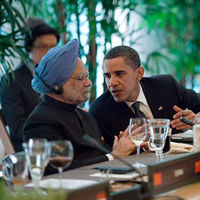In hosting Indian Prime Minister Manmohan Singh this week for the first state visit of his administration, President Barack Obama can claim to be taking India seriously as a partner and rising power. But Indian doubts remain.
U.S.-India relations are currently drifting, rather than surging forward as they had been for a decade. Bilateral ties developed an unprecedented intimacy under President George W. Bush, capped by an agreement on civilian nuclear cooperation that required both countries to take considerable political risks and overcome stubborn international opposition. Building on work begun by President Bill Clinton, Bush and his Indian counterparts unshackled the relationship from its troubled past and implemented a forward-looking agenda -- on defense cooperation, high-tech trade, energy, and other areas -- consonant with India's status as a natural ally of the United States and a rising force in world affairs.
Obama has sought to build on these achievements, dispatching Secretary of State Hillary Clinton to New Delhi and reorganizing various bilateral dialogues. Singh's visit to Washington features, as such summits do, the unveiling of new initiatives like a U.S.-India Education Council and a revitalized forum for American and Indian CEOs.

